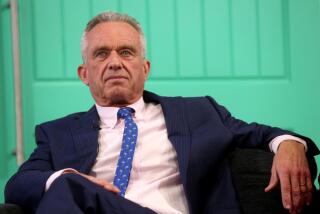Chile Regime’s Supporters Pelt Kennedy Motorcade
- Share via
SANTIAGO, Chile — Sen. Edward M. Kennedy, arriving Wednesday on a fact-finding trip, found the highway from the airport to the Chilean capital blocked for nearly two hours by supporters of President Augusto Pinochet’s dictatorship, who denounced him as a Soviet stooge, passed out reminders of Chappaquiddick and pelted cars with rotten eggs and tomatoes.
Kennedy, whose criticism of the regime’s civil rights record has gained him the description of “Chile’s worst enemy in the West” in the pro-government press, was later told by U.S. Embassy officials that they had “precise information” that members of Pinochet’s government organized and financed the crowd of about 300 demonstrators.
Foreign Minister Jaime del Valle denied this, but the demonstration was clearly tolerated by the regime. Public protests by the opposition here have been consistently broken up with police force.
However, the Massachusetts Democrat, once he had made his way into Santiago, was himself the center of a rally as an anti-government crowd gathered in a plaza to hear his message of democracy and to cheer him.
Kennedy visited a Santiago hospital where he was applauded by doctors, nurses and bystanders. Then, he met with opposition political, civil rights and union leaders at a heavily guarded social club. Afterward, as he strode into a crowd that had gathered in a nearby plaza, he was greeted with shouts of “Help us, Kennedy!”
In an impromptu speech, Kennedy told the crowd, “I have come here from Brazil, Uruguay and Argentina, where the people have said ‘no’ to military juntas. Will Chile be free one day, too?”
“Chile libre!” the crowd shouted back.
In a country where Pinochet’s military-installed and -backed regime has ruled for more than 12 years and where political parties are banned, even such a symbolic expression of opposition opinion was an event.
The incident at the airport began when Kennedy arrived from Argentina on the latest stop of a Latin American tour and discovered that the demonstrators, equipped with banners and loudspeaker vehicles, had blocked off the road to town.
In addition to yelling denunciations of the senator, the demonstrators scattered leaflets with pictures of Mary Jo Kopechne, the campaign worker who drowned in 1969, when a car driven by Kennedy went off the bridge at Chappaquiddick Island off Massachusetts’ Martha’s Vineyard.
About 30 national policemen, under the command of a colonel, stood aside while the demonstrators blocked the road with cars and pelted anyone who tried to drive through with rotten eggs and tomatoes.
Envoy’s Car Hit
U.S. Ambassador Harry Barnes’ car was one of those pelted, and the back window was cracked by stones. Barnes was not in the vehicle. The president of the Chilean Human Rights Commission, Jaime Castillo, who had come to meet Kennedy, was slightly injured when a stone smashed a window of his car.
The impasse ended after discussions with high-ranking police officers. Two police helicopters were provided, and Kennedy’s party was flown into the capital.
The demonstrators were mainly students from the Catholic University, where right-wing groups led by Jaime Guzman, an ideologue of the regime, have formed part of a pro-Pinochet movement.
The senator has been a consistent critic of human rights violations in Chile, as well as in the Soviet Union, South Africa and Central American countries. His name is on legislation that has banned U.S. military arms sales to this country because of persistent rights violations.
Pinochet, Chile’s 69-year-old military strongman, ordered all members of his government to refuse to meet with Kennedy.
In an airport arrival statement, Kennedy maintained that his presence could not be considered “meddling” in Chile’s internal affairs since this country has received $2 billion in loans in the last four years from funds appropriated by Congress.
‘Need Not Apply’
“The Senate has a legitimate interest in the purposes to which those loans are going,” he said. “If that is meddling, then Chile need not apply for any new loans.”
Chile’s financial condition is critical. It is unable to meet interest payments on $20 billion in foreign loans without borrowing more money. Last month, the major creditor banks loaned Chile $760 million to keep up the interest payments.
U.S. congressional approval of further financial aid to Chile is endangered, according to Kennedy, by Pinochet’s refusal to negotiate with the opposition on restoration of an elected constitutional government and by reports of continuing rights violations, which were presented to the senator by local church groups.
Kennedy will fly to Peru today on the last stop of his South American trip, during which he has proposed easier terms for debt payments by South America’s democratic governments.
More to Read
Sign up for Essential California
The most important California stories and recommendations in your inbox every morning.
You may occasionally receive promotional content from the Los Angeles Times.













